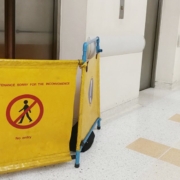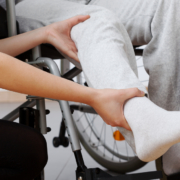What Should You Know About Workplace Accidents?

Even if your employer is precise in following OSHA (Occupational Safety and Health Administration) rules and regulations, certain environments are accident prone. Maybe the employer forgot to dry a wet floor or your harness was not secured properly on a scaffolding unit. Injuries are sometimes inevitable.
According to the U.S Department of Labor, the most frequently cited issues include construction slips and falls, hazard communication standards, scaffolding accidents, failed respiratory equipment, lack of control of hazardous energy, poor electrical wiring and lack of machine guarding. If you are caught in a workplace accident – it is recommended to first obtain medical aid, next notify a supervisor about the injury and how it occurred, finally complete a claim for worker’s compensation on form C-3 and mail it to the nearest Workers Compensation Board Office.
Workers Compensation laws require an injured employee to report an incident within 30 days to their employer. In the report, it is important to write when the accident happened, how you hurt yourself and what symptoms you’re experiencing. If injuries leave you unable to travel to a worker’s compensation office, you can also file online, by telephone or by mail.
After reporting the issue, your employer will file a claim with their insurance company. During the investigation, the insurance company will determine your eligibility for benefits. This investigation may include reviewing medical records, analyzing your work experience, education and wages. Also, the insurance company will request that you undergo a medical examination to access the injuries. Within 18 days, an insurance company must approve or deny your claim, according to New York State Law.
Additionally, it is important to note that a failure to report an incident may force the employee to delay their investigation or lose the case. However, there are exceptions to late reporting. For example, a condition like arthritis or a long-term respiratory injury may develop over time. A condition like this, which is related to work still needs to be reported. But it is understandable if there is a lag in addressing the issue. However, if the case is still denied it might be helpful to use a worker’s compensation lawyer to dispute the matter.
Before a workplace accident, it is also important to be aware of preventative measures that ensure the wellbeing of the workers. For example, wear preventive gear, follow emergency drills, insist on quality safety training and don’t rush high-risk work. In addition, to avoid losing your potential benefits you should disclose prior injuries, return to work when able and be clear about your symptoms and complaints (It is not time to be humble).
Be sure to remember that workplace accidents do not always include physical injuries. Especially, in highly stressful careers like law enforcement sometimes on-the-job stress can trigger depression, anxiety, and post-traumatic stress disorder. Creating a safe space for employees to express their feelings promotes a healthier work environment. For example, whether it’s bringing in puppies to the office to comfort stressed workers or weeding out poor employment practices – it is important that these issues are taken seriously.











Leave a Reply
Want to join the discussion?Feel free to contribute!